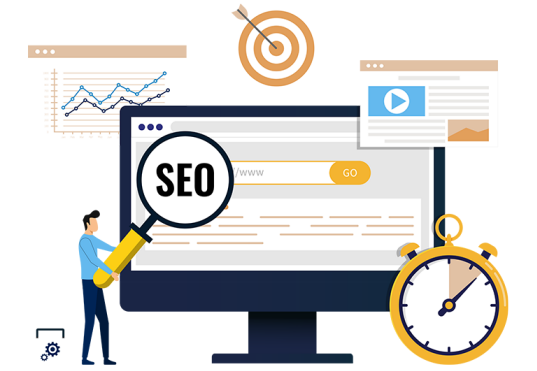Introduction
San Diego’s vibrant business ecosystem and growing digital landscape make it a hotbed for eCommerce opportunities. However, as more companies compete for online visibility, the need for a well-optimized SEO strategy has never been more crucial. ECommerce web development and SEO go hand in hand, ensuring that your website not only looks appealing but also performs well in search engine rankings. This article explores why SEO for eCommerce websites and how San Diego businesses can harness it to drive traffic and boost sales.
Why SEO Matters for ECommerce in San Diego

- In a city known for its innovation and tech-savvy consumers, visibility in search engines can make or break your business. A well-executed SEO strategy can dramatically improve your website’s ranking on search engines like Google, making it easier for potential customers to find you.
- The San Diego market is unique, with its diverse population, thriving tourism sector, and competitive business landscape. By understanding and targeting these local characteristics, eCommerce businesses can tailor their SEO strategies to attract the right audience.
Increasing Visibility in a Competitive Market
- In the world of eCommerce, appearing on the first page of search results is essential. Most users don’t go beyond the first page, making SEO a key component of your business strategy.
- By optimizing for high-traffic keywords and implementing proper on-page SEO techniques, your business can stand out from the competition. Using SEO best practices like keyword research, meta description optimization, and quality content creation can drive more organic traffic to your site.
Local SEO Strategies for San Diego Businesses
- Local SEO is vital for San Diego eCommerce businesses looking to capture a nearby audience. With more people searching for “near me” services and products, your website must be optimized to rank for local search terms.
- Tactics like claiming and optimizing your Google My Business listing, using location-based keywords, and gathering positive customer reviews can significantly enhance your local SEO. For instance, phrases like “best surf shop in San Diego” or “organic food delivery San Diego” can attract a more targeted audience.

On-Page SEO for ECommerce Websites
- On-page SEO is the foundation of a well-optimized eCommerce site. This includes optimizing meta tags, header tags, and creating keyword-rich, engaging content.
- High-quality product descriptions that include relevant keywords can improve your site’s SEO while providing valuable information to shoppers. Additionally, using optimized images with proper alt tags ensures your site is accessible and search-engine friendly.
Off-Page SEO and Link Building

- Off-page SEO focuses on building authority for your website. One of the best ways to do this is through link building, where you earn backlinks from reputable websites. The more quality backlinks your site has, the higher its domain authority and search engine ranking.
- San Diego businesses can benefit from engaging with local blogs, publications, and influencers to earn backlinks. Participating in community events and sponsoring local initiatives can also generate valuable links and boost your visibility.
Mobile Optimization and SEO
- With a large percentage of consumers shopping via mobile devices, having a mobile-optimized website is non-negotiable. Google’s algorithms favor mobile-friendly sites, making this a crucial aspect of SEO.
- Techniques like responsive website design, faster page loading times, and simplified navigation ensure that your site provides an excellent user experience. Mobile optimization is not just about design; it also involves ensuring that content and images are easy to view on small screens.
User Experience (UX) and Its Role in SEO
- A great user experience (UX) is closely tied to SEO. Search engines consider factors like load times, bounce rates, and session duration when ranking websites.
- Features like easy-to-navigate menus, clear calls-to-action (CTAs), and well-organized product categories can keep visitors engaged and reduce bounce rates. The better the UX, the more likely users are to stay on your site, which improves your SEO performance.
Content Marketing for ECommerce SEO
- Content marketing remains one of the most effective ways to drive organic traffic. Publishing blog posts, how-to guides, and product tutorials that include targeted keywords can significantly enhance your SEO.
- For San Diego eCommerce businesses, consider creating content relevant to the local community, such as “Top Outdoor Activities in San Diego” or “How to Choose the Best Local Wines.” This not only provides value to your audience but also boosts your search engine rankings.
The Role of Technical SEO in ECommerce Web Development
- Technical SEO involves optimizing your site’s infrastructure to make it easier for search engines to crawl and index. This includes creating a clean site architecture, submitting XML sitemaps, and using structured data for rich snippets.
- ECommerce developers must pay attention to site speed, URL structure, and the use of canonical tags to avoid duplicate content issues. Ensuring that your site is technically sound can give you a significant edge in search rankings.
Leveraging Analytics to Refine SEO Strategies
- Using tools like Google Analytics and Google Search Console, San Diego businesses can track the performance of their SEO strategies. Metrics like organic traffic, conversion rates, and keyword rankings provide insights into what’s working and what needs improvement.
- Data-driven SEO allows you to adjust your strategy based on real-time performance, ensuring that your efforts are always aligned with your business goals.
SEO for Product Pages and Category Pages
- Optimizing product and category pages is crucial for driving traffic to your eCommerce site. Use descriptive, keyword-rich titles and meta descriptions for each product.
- Implement internal linking between related products and categories to improve navigation and SEO. For example, linking surfboards to wetsuits on a San Diego surf shop site can enhance the user experience and boost rankings.
Voice Search Optimization for ECommerce

- Voice search is on the rise, and optimizing for it can give your business a competitive advantage. Use long-tail keywords and conversational phrases that mimic how people speak. For instance, “Where can I buy organic coffee beans in San Diego?” is a voice-friendly search query.
- Ensure that your site’s content answers common questions your target audience might ask, and make use of structured data to enhance your chances of appearing in voice search results.
The Long-Term Benefits of SEO for San Diego Businesses
- Unlike paid advertising, the benefits of SEO are long-lasting. Once you rank well for your target keywords, you can enjoy a steady stream of organic traffic.
- SEO is a continuous process, but the investment pays off over time as your website gains authority and attracts more visitors. For San Diego businesses, having a strong SEO foundation means long-term visibility and growth in a competitive market.
Conclusion
SEO is a vital component of eCommerce web development for San Diego businesses. By investing in both on-page and off-page SEO strategies, optimizing for mobile, and providing a stellar user experience, you can position your business for sustained success. As the eCommerce landscape continues to evolve, staying ahead with comprehensive SEO practices will ensure your business remains visible and competitive in San Diego’s dynamic market.






